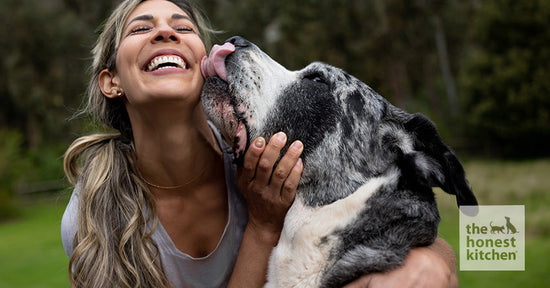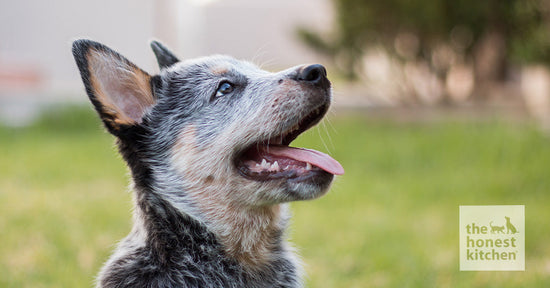If there’s one thing Blue Heeler owners will agree on, it’s that this adorable and fun-loving breed comes with endless energy — happy, bouncing, and always ready for adventure!
These intelligent, resourceful, hard-working dogs’ lifespan typically ranges between 12 and 16 years. Consistent, high-quality nourishment can play a big role in the breed’s life expectancy.
But their thick coats, sturdy, compact builds, and high-energy lifestyles also need special dietary consideration to maintain their endearing vitality. They’re also prone to specific health issues, which can be supported with a proper diet.
If you currently own a Blue Heeler or are thinking about getting a puppy, here’s what you need to know about the breed’s nutritional needs so they can thrive.
Health Considerations for Blue Heelers
Blue Heelers are herders by trade. Dog owners should be aware that, with their natural high energy and alert personalities, this breed can have some potential health concerns.
Atopy
Atopy is an allergic skin condition seen often in Blue Heelers, caused by sensitivities to environmental allergens like:
Pollen
Dust mites
Mold
Its symptoms are itching and skin inflammation. You may notice atopy if your Heeler is constantly licking or biting at their skin, having ear infections, or experiencing hair loss.
Hip Dysplasia
The Blue Heeler may also deal with hip dysplasia, a prevalent joint issue. Since they’re active dogs, they may experience joint issues (especially as they age). Improper nutrition can further increase the odds, too.
Fortunately, glucosamine supplements are a proactive way to help your pet avoid hip dysplasia. Physical therapy, anti-inflammatory medications, joint fluid modifiers, and surgery are available for dogs that end up with this problem. If you have any concerns about your Heeler’s hip or joint health, be sure to follow up with your vet as soon as possible.
Obesity
Even with their high energy levels and love of exercise, Blue Heelers can pack on a few extra pounds if they (and their owners) aren’t careful. Pounds can creep up on Heelers if:
They don’t get the consistent exercise they need to burn off their food.
Their owners feed them too often, give them portions that are too big, or overdo it on the treats.
No matter the life stage, obesity can lead to other issues for your dog’s health. The good news is that by reevaluating your dog’s food and treat portions and adding more activity to their schedule, they can lose weight.
Blindness and Deafness
Blue Heelers are genetically susceptible to blindness and deafness. Remember that regularly visiting the vet is the best way to catch genetic issues before they progress too far.
Feeding Guidelines and Nutrition Tips for Blue Heelers
Choosing your pet’s food may be confusing, and you may have several questions like:
How many carbohydrates and how much protein do they need?
What do those claims of “grain free” and “human grade” mean?
Knowing the types of meals and treats to look for is the first step toward giving dogs the nutrients they need to thrive and age gracefully. Here are our top tips for choosing your dog’s food.
Incorporate High-Quality Protein and Fats
Getting protein and fats in your dog’s diet is essential. But, some sources of these elements may not be as good as others. Proteins and fats can come from fillers and by-products that may not be good for your dog. Sometimes, dogs can have trouble with these ingredients and end up with digestive issues. Look for food that lists whole meat protein sources as the first ingredient:
Wild caught fish
Chicken
Turkey
Duck
Beef
Venison
Meet AAFCO Nutritional Requirements
The Association of American Feed Control Officials (AAFCO) is a nonprofit organization that sets animal feed and pet food standards. They guide ingredient definitions and label laboratory standards to safeguard animal health.
AAFCO requires any ingredient that goes into pet food to have its nutritional and technical purpose established through a legally recognized due process.
An AAFCO statement may appear on a pet food container. It will state which life stage the food is suitable for, along with the “complete and balanced” designation.
Explore Human Grade Dog Food
Finished products made with ingredients fit for human consumption and processed in a way that’s acceptable for human food are considered human grade . Food with the “feed grade” designation doesn’t meet the same rigorous quality or nutritional criteria.
If you’re interested in exploring human grade pet food options, The Honest Kitchen is a great place to turn. As the first 100% human grade pet food provider, we pride ourselves on creating delicious recipes with wholesome ingredients that pets love. Check out our True Stories from Honest Kitchen customers!
Avoid Additives Like Artificial Flavoring
Some companies add artificial flavoring to their recipes to make the food more appealing to dogs and maintain a consistent taste. However, they may be laden with chemicals that can contribute to health problems or agitate food allergies.
Artificial flavorings have no nutritional value, so it’s best to look for recipes where the ingredients’ flavors speak for themselves!
Avoid Highly Processed Ingredients and Unidentifiable Meats
Ingredients like meat meal go through high-temperature processing that can decrease the protein’s nutritional quality. The process may also introduce contaminants that could be harmful to your pet.
When the ingredient list doesn’t specify the type of meat in the food, steer clear. This may mean the meat comes from the less desirable parts of the animal (like hooves, teeth, or bone) and could cause nutritional inconsistencies that don’t support a balanced diet.
Best Food for Blue Heelers: The Honest Kitchen’s Top Picks
Dehydrated Whole Grain Chicken
This pet food is a great option for adult Blue Heelers. The free range chicken, barley, potatoes, peas, carrots, and other nutritious vegetables, fruits, and grains make it a top pick for this breed.
It also boasts several minerals, taurine, multiple vitamins, and fish oil to give your pet what they need to stay healthy and happy.
Dehydrated Limited Ingredient Chicken
This recipe starts with free range chicken along with quinoa, spinach, sweet potatoes, parsley, and kelp. It’s topped with a boost of vitamins to provide antioxidants and minerals to add to the nutritional value.
There are no artificial preservatives or flavors in this recipe; just healthy, delicious goodness for dogs of any life stage!
As with the other dehydrated choices here, picky eaters love this recipe. That’s because the gentle dehydration process maintains the ingredients’ delicious flavors. So, no need to worry about your pup sniffing it and walking away hungry.
Dehydrated Limited Ingredient Fish
Fish is especially healthy for Blue Heelers because it’s rich in Omega-3 fatty acids, which support inflammation reduction, heart health, and skin and coat health.
Made with white fish, coconut, chickpeas, pumpkin, celery, and spinach, this recipe is super easy for Heelers to digest. Just add a little warm water and your pet will clean their bowl every time.
Functional Pour Overs: Hip & Joint Chicken Stew
If your dog is a picky eater, or you just want to top off their dry dog food, use one of our tasty Pour Overs to liven up mealtime. This popular Pour Over over recipe is packed with chicken bone broth, chicken, carrots, butternut squash, tapioca, fish oil, and, turmeric. Simply add it to the top of your dog’s dry food or mix it with a dehydrated recipe to give your Heeler a delicious and balanced meal.
Maintain Your Blue Heeler's Well-Being With The Honest Kitchen
If you want your Blue Heeler to eat a whole food, balanced diet, try The Honest Kitchen. We are committed to using only the finest ingredients and methods for making human-grade pet food that’s delicious and healthy.
Check out our complete line of dog food to find your pet’s next favorite recipe!
* Health Disclaimer: This post is educational in nature and doesn’t constitute health advice. Please consult your pet's veterinarian or other healthcare professional for specific guidance on this topic.




